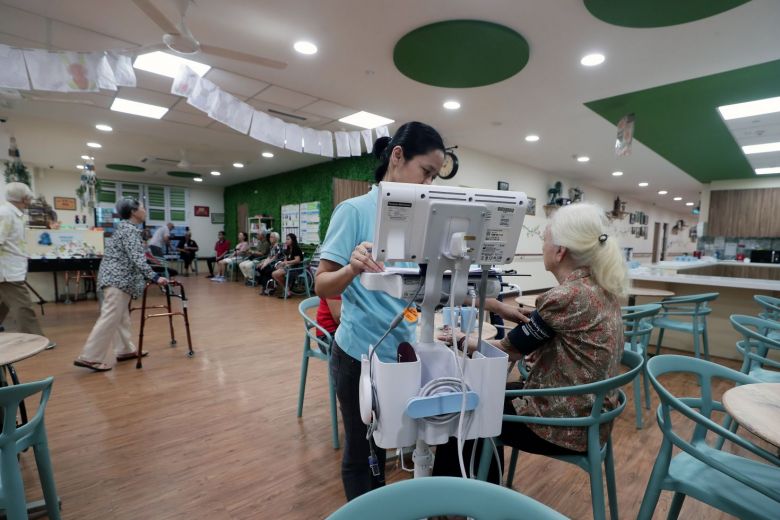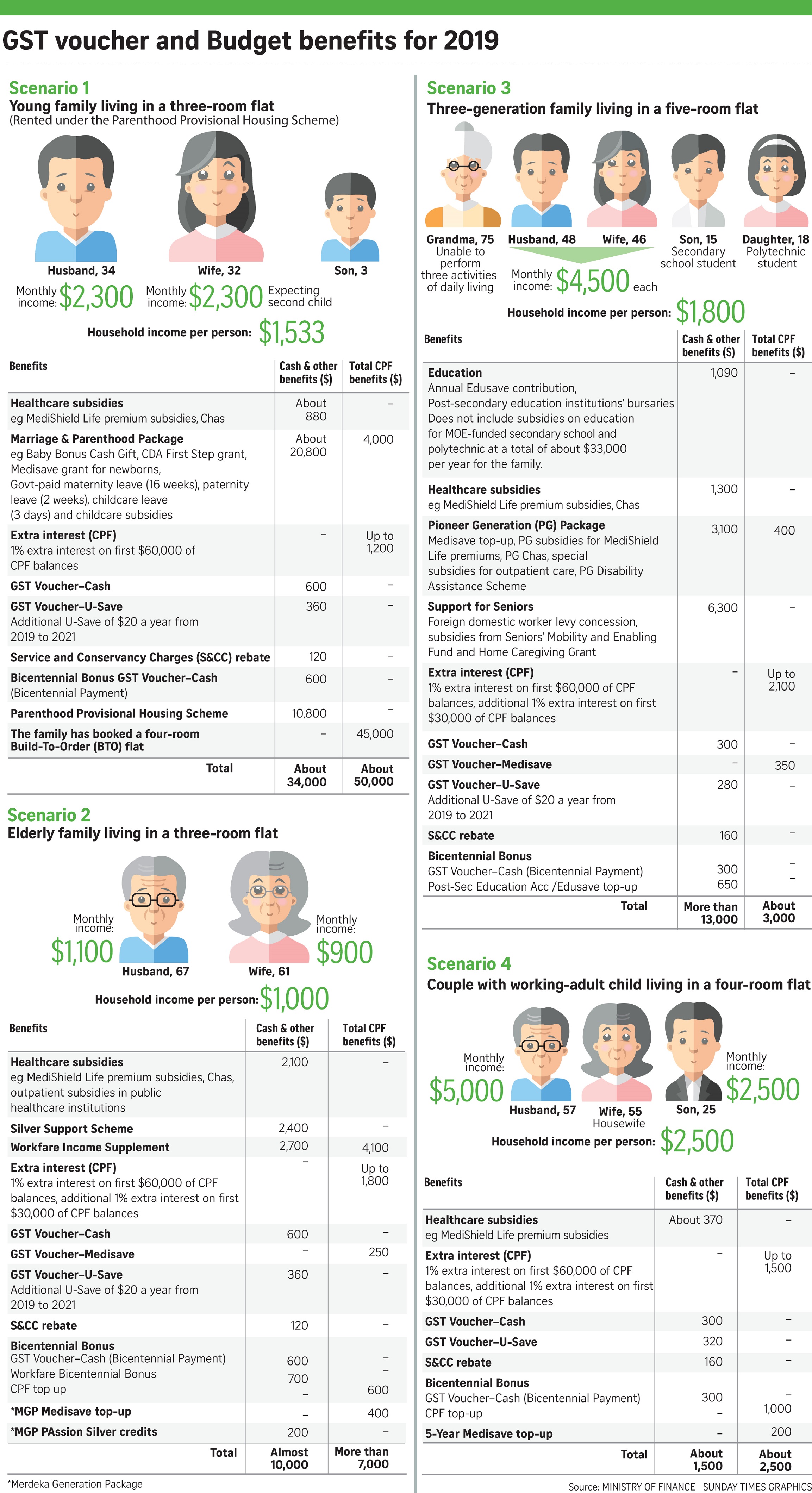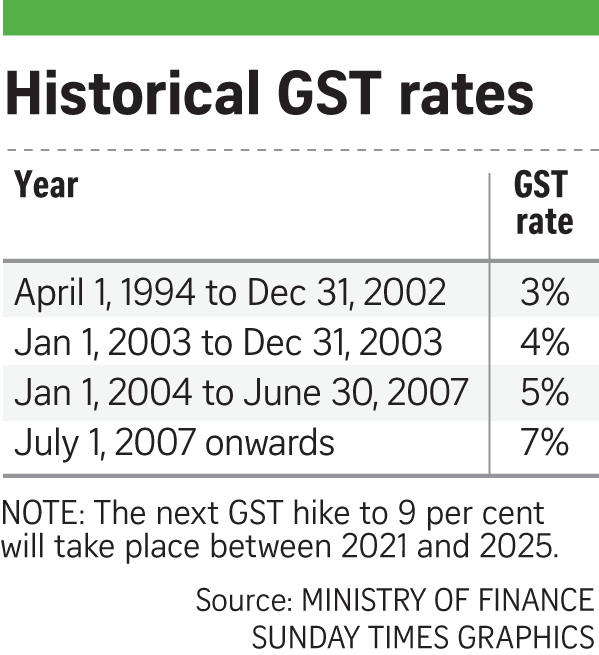None of us like forking out more money to the Government than we have to. Since the goods and services tax (GST) came along in 1994, it has been accompanied by a range of offsets to take some of the pain away, especially for lower-income groups.
The latest payout was last month when about 1.4 million Singaporeans received up to $300 each in the form of GST Voucher - Cash. In a few weeks, about 930,000 eligible HDB households will each receive their GST Voucher - U-Save to help offset utilities bills.
The GST Voucher scheme was introduced in 2012 to help the lower-and middle-income households with daily expenses and to defray GST expenses.
It has since become an indispensable source of support, providing assurance that there is government support for GST expenses for individuals and households, particularly those with lower incomes.
If you received the GST Voucher - Cash payout last month, you can expect to get the GST Voucher - Cash (Bicentennial Payment), which provides an additional cash payment of up to $300.
All in, the Government will pay out $1 billion in GST vouchers and Medisave top-ups this year, benefiting 1.7 million Singaporeans.
The Sunday Times highlights the GST Voucher scheme and other government assistance measures.
GST vouchers (Cash, Medisave, U-Save)
The GST Voucher scheme has three components:
• GST Voucher - Cash: This goes out every August to defray some of your GST expenses.
• GST Voucher - Medisave top-up: This is credited to the CPF Medisave accounts of eligible Singaporeans aged 65 and above every August. It can be used to pay for their own or their immediate family members' hospitalisation expenses incurred at any of the participating medical institutions under the Medisave scheme. Medisave can also be used to pay for day surgery and approved outpatient treatments.
• GST Voucher - U-Save: This is given out over four payments each year as a rebate to help HDB households offset part of their utility bills. Note that GST Voucher - U-Save payments are credited automatically to the household's utilities account once it is opened.
Each household will get a GST Voucher - U-Save of up to $400 this year, based on the HDB flat type. This includes an additional U-Save of $20 a year from this year to 2021.
The U-Save rebates are paid out in January, April, July and October this year.
Singaporeans will get some or all of these three components depending on their age, income and the valuation of their homes.
People who own more than one property are not eligible for the GST vouchers - Cash, Medisave and U-Save.
The eligibility criteria is available at www.gstvoucher.gov.sg
Bicentennial Bonus
This was announced at Budget 2019 to commemorate the bicentennial year and provide additional help to those who need it. In addition to the GST Voucher - Cash (Bicentennial Payment), the Bicentennial Bonus package includes:
• Top-ups to Edusave accounts or Post-Secondary Education Accounts (PSEA) for Singaporeans aged seven to 20;
• A Workfare Bicentennial Bonus, which provides additional assistance to lower-wage workers who received Workfare Income Supplement payouts for work done last year;
• A CPF top-up for lower-income Singaporeans aged 50 to 64 who have lower CPF balances; and
• A personal income tax rebate for Year of Assessment 2019.
The top-ups to Edusave and PSEA were made in June. The GST Voucher - Cash (Bicentennial Payment), Workfare Bicentennial Bonus and CPF top-up will be paid to eligible Singaporeans at the end of this year.
Budget 2019
In addition, there are various Budget 2019 support programmes for young couples and families, workers and seniors. Check them out at these links:
Other government grants and assistance schemes
FOR ALL SINGAPOREANS
Subsidies for education, healthcare and housing
Education: The Ministry of Education provides significant subsidies to needy Singaporean students in government and government-aided schools, specialised schools and institutes of higher learning so as to enhance access to opportunities in education. Additional financial assistance is also available to needy Singapore citizen students from lower-and middle-income families in independent schools.
Healthcare: There are healthcare financing schemes and subsidies available in Singapore such as MediShield Life, CareShield Life, Medisave, Community Health Assist Scheme (Chas) and ElderShield.
For instance, MediShield Life is a basic health insurance scheme which helps all Singaporeans and permanent residents to pay large hospital bills and selected costly outpatient treatments.
CareShield Life (available from next year) is a new basic long-term care insurance scheme that features higher payouts that increase over time, with no cap on payout duration, to protect against the uncertainty of long-term care costs in the event of severe disability.
Medisave is a national medical savings scheme that can be used to pay for approved healthcare expenses throughout a lifetime.
ElderShield, introduced in 2002, is a severe disability insurance scheme that aims to provide basic financial protection to Singaporeans who need long-term care, especially in their old age.
Chas enables Singaporeans from lower-to middle-income households, as well as Pioneers and Merdeka Generation seniors, to receive subsidies for medical and dental care at participating general practitioner (GP) and dental clinics.
Housing: The income ceiling to qualify for new HDB flats has recently been raised from $12,000 to $14,000. On top of the subsidised purchase prices, eligible first-time buyers of new HDB flats may receive Enhanced CPF Housing Grants of up to $80,000. For resale flats, eligible first-time buyers may receive up to $160,000 in housing grants.
Tax reliefs for parenthood, caregiving and retirement savings
There are tax reliefs to encourage family formation, filial piety and upgrading of skills and reliefs given in support of individuals saving for retirement and serving national service.
Service and Conservancy Charges (S&CC) rebate
The S&CC rebate helps to offset some of the expenses of Singaporean HDB households. This has been paid out annually since 2013. Each eligible household will receive up to 31/2 months of S&CC rebate in Financial Year 2019 (April 2019 to March 2020), depending on their flat type.
The rebate will be disbursed every three months.
FOR YOUNG FAMILIES
Baby Bonus, Child Development Account (CDA), Medisave grant for newborns
The Baby Bonus Scheme helps to lighten the financial costs of raising children. It includes a cash gift, CDA First Step grant and government matching to savings in the child's CDA.
Kindergarten, infant care and childcare subsidies
Infant care, childcare and kindergarten subsidies help parents to defray some of the cost of childcare fees and ensure affordability and accessibility to services.
Parenthood Provisional Housing Scheme (PPHS)
As part of the enhanced Marriage & Parenthood Package, the PPHS helps to temporarily house families as they await the completion of their new flats. Over the years, the scheme has been extended to include more family types.
FOR MIDDLE-AND LOWER-INCOME FAMILIES
Community Health Assist Scheme (Chas)
Chas enables Singaporeans from lower-and middle-income households to receive subsidies for medical and dental care at participating GP and dental clinics.
Edusave Merit Bursary
Singaporean students in government and government-aided schools who perform well in school and whose household income does not exceed the prescribed income criteria are eligible.
CDC/CCC-University Bursary
This scheme is for needy full-time Singaporean undergraduates. It is co-funded by the Government, Community Development Council and Citizens' Consultative Committee.
FOR WORKERS
Workfare Income Supplement (WIS) scheme
The WIS scheme was introduced in 2007 as a permanent feature and rewards regular work and individual effort by providing cash and additional CPF contributions to help with expenditure needs and retirement savings of older lower-wage workers and people with disabilities who work.
FOR SENIORS
Intermediate and long-term care subsidies
Recognising that the bills for such services can be significant over longer periods, the Government provides subsidies to offset the costs for these people needing care.
Foreign domestic worker levy concession
The FDW levy concession is part of the package to support Singaporeans needing care, such as young children, elderly people and those with disabilities. Eligible employers of a foreign domestic worker can get a concessionary rate of $60 a month if they meet the qualifying criteria.
Seniors' Mobility and Enabling Fund (SMF)
If you have an elderly family member who lives at home and needs subsidies for assistive devices or home healthcare items, you can apply for SMF subsidies.
Enhancement for Active Seniors (Ease)
HDB introduced Ease in 2012 which subsidises home modifications so old folk can live at ease in their homes. They include slip-resistant treatment to floor tiles in bathrooms, grab bars and ramps.
Pioneer Generation (PG)/ Merdeka Generation (MG) packages
The Pioneer and Merdeka Generation packages were launched to thank older Singaporeans for their hard work and dedication in building Singapore.
5-Year Medisave top-up
As announced in Budget 2019, Singaporeans who were born on or before Dec 31, 1969 (age 50 and above this year), and do not receive PG or MG benefits will each receive a Medisave top-up of $100 annually from this year to 2023.
FOR THOSE WITH GREATER NEED
Silver Support Scheme
This scheme provides additional help for elderly Singaporeans who had low income throughout life and who now have little or no family support. It is targeted at the bottom 20 per cent of Singaporeans aged 65 and above. There is no need to apply for Silver Support.
Public Rental Scheme
Flats under the Public Rental Scheme are heavily subsidised to cater to households who have no other housing options. You must fulfil certain eligibility criteria to apply for a rental flat.
ComCare and Public Assistance
ComCare provides social assistance for low-income individuals and families. ComCare assistance is available at the Social Service Offices.
MediFund
This is an endowment fund which provides a safety net for Singaporeans who face financial difficulties with their healthcare bills after government subsidies and other means of payment, including MediShield Life, Medisave and cash.






